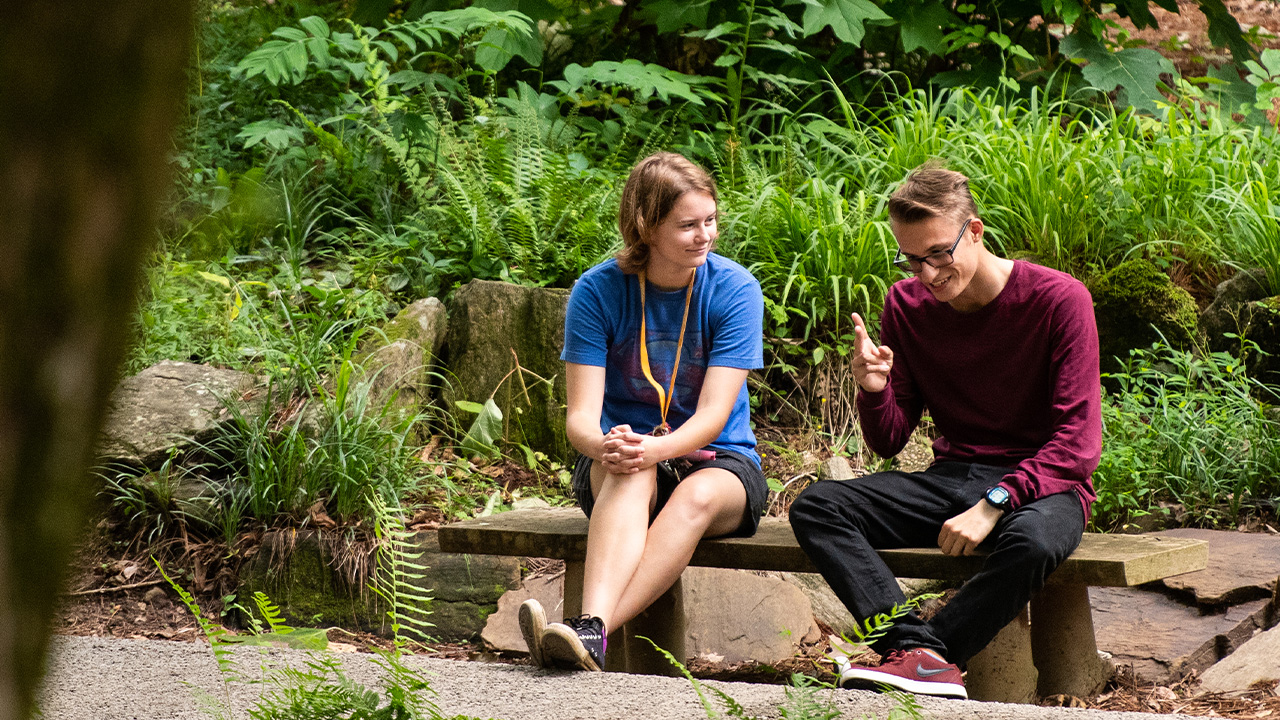content body
Everyone knows we spend too much time on our phones. But students in Auburn’s Parks and Recreation Management program are learning firsthand just how beneficial it is to put down the electronic devices and get outside.
The course “Nature, recreation and health” is a hands-on class where students learn how the presence of parks and recreation systems and access to nature contribute to a healthier society.
Allie McCreary, assistant professor in the College of Forestry, Wildlife and Environment (CFWE), teaches the class each fall and loves to see her students’ understanding of this relationship increase just as the weather starts to warm up.

In the course “Nature, recreation and health," students get out of the classroom and into nature — at Auburn's Donald E. Davis Arborteum.
McCreary introduces her students to topics that are unfamiliar to them, like the role of nature in therapeutic recreation, the causes of Nature Deficit Disorder and biophilia, which is humans’ innate connection to nature. But she also covers one subject they’re already quite familiar with: the rising rates of technology use for young people in school.
“That’s usually particularly relevant to the students in the class,” she said. “They’re 19 or 20 years old and they’re not too far removed from spending eight hours a day on a screen in school. So, they’re reading the research and they’re realizing, ‘Yeah, this is our lived experience.’”
And as one would expect, McCreary gets the students out of the classroom. She teaches a Japanese concept called “Shinrin-yoku” — the English translation is “forest bathing” — in which participants immerse themselves in the sights, sounds and smells of nature.
It’s just a short walk from the CFWE building to the College of Sciences and Mathematics’ Donald E. Davis Arboretum, where McCreary leads the students in a forest bathing activity.
“You can still hear some of the urban sounds, and of course, we’re right on campus, but they are surrounded by those different sensory elements of nature like the smell of the trees, the sounds of the birds,” she said. “You’re just really bathing yourself in those surroundings and different sensory elements of nature.”
Want to enroll in “Nature, recreation and health?” This class, which is open to all majors, meets on Mondays, Wednesdays and Fridays at 1 p.m. in the fall semester. Register for PARKS 4200 (CRN 1137).
Get in class and get outsideMcCreary also has her students do a deep dive into a topic of their own choosing, such as the importance of dark skies, or reduced light pollution, and the benefits of a green space view for hospital patients. With the option to present in class or make a video or podcast, students enjoy sharing their findings with their peers, regardless of whether they’re applicable to their career plans.
“I studied the physical and mental health benefits of owning indoor plants,” said parks and recreation management major Elizabeth Burns, who hopes to be an interpretive ranger someday. “I wanted to focus on the direct benefits that being in nature provides, even if that ‘nature’ is the houseplant you purchased to brighten up your apartment.
“Researching this topic was a surprisingly fun experience, and getting the chance to then share what I had learned helped me to feel more confident and excited in my own research.”

Faculty members Wayde Morse and Allie McCreary recently lent their expertise to a five-year update of Alabama’s Statewide Comprehensive Outdoor Recreation Plan, a document that guides state organizations in supporting outdoor recreation development.
Classmate Duncan Smith researched the effects of pollution in the Tennessee River on communities and recreation.
“My mother and her whole family grew up recreating on the Tennessee River,” he said. “For my career, I want to manage climbing crags or gyms, so pollution in the river doesn’t really affect me, but it was still cool to learn about the water I grew up swimming in.”
McCreary and fellow faculty member Wayde Morse recently lent their expertise to a five-year update of Alabama’s Statewide Comprehensive Outdoor Recreation Plan, a document that guides state organizations in supporting outdoor recreation development.
McCreary said the statistics they collected by surveying state residents showed mental health is a major reason people get outside. She’s happy to be sharing these findings with the next generation of recreation leaders in class.
“We’ve got the data analyzed, and people are reporting that they’re using recreation and time in nature as a restorative practice for both mental and physical health,” she said. “They want to relax and recharge and get away from the usual demands of life.”




